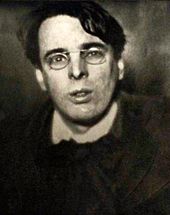Irish poet William Butler Yeats, winner of the 1923 Nobel prize in literature, published “The Fisherman” in 1919. In the poem, Yeats describes his past observation of a fly fisherman. In his memory, this man represents a simple life, free from the daily pressures most of us face. No doubt, Yeats faced serious pressures, indeed; when he wrote “The Fisherman,” he was already a successful poet and felt many demands upon his time and talents. And he had been deeply involved in Irish nationalism and would immerse himself in politics again, in the future.
I share the poem, below. Following it is commentary upon its meaning by A.A. Luce. Importantly, Luce was a philosopher and a fly fisher, himself.
“The Fisherman”
Although I can see him still—
The freckled man who goes
To a gray place on a hill
In gray Connemara clothes
At dawn to cast his flies—
It’s long since I began
To call up to the eyes
This wise and simple man.
All day I’d looked in the face
What I had hoped it would be
To write for my own race
And the reality:
The living men that I hate,
The dead man that I loved,
The craven man in his seat,
The insolent unreproved—
And no knave brought to book
Who has won a drunken cheer—
The witty man and his joke
Aimed at the commonest ear,
The clever man who cries
The catch cries of the clown,
The beating down of the wise
And great Art beaten down.
Maybe a twelve-month since
Suddenly I began,
In scorn of this audience,
Imagining a man,
And his sun-freckled face
And gray Connemara cloth,
Climbing up to a place
Where stone is dark with froth,
And the down turn of his wrist
When the flies drop in the stream—
A man who does not exist,
A man who is but a dream;
And cried, “Before I am old
I shall have written him one
Poem maybe as cold
And passionate as the dawn.
A.A. Luce, as a professor at Trinity College Dublin, was a colleague and acquaintance of Yeats’. In his remarkable Fishing and Thinking (Swan Hill, 1959), he wonders why Yeats chose to write about an angler:
Why did he pitch on angling, of all occupations? Why did he idealize the angler? It could not have been an accident. He must have found something in his own angling that answered a felt need. Was it objectivity, the sense of control by the object? The artistic imagination is in special need of such control and values it. When one’s sense of reality is perturbed, and the line between the real and the imaginary wavers, and perhaps the point approaches when “nothing is but what is not”, a day on a river is wonderful cure. It takes us out of ourselves, and confronts us with the comforting blank wall of something not ourselves, and confronts us with the comforting blank wall of something not ourselves, to which our sensing, imagining, thinking and action must conform. The sanity of the angler’s outlook commends angling to the sick in mind. …. The fresh air, the open spaces, the physical exercise, the nature of the occupation and the objectivity of the chase combine to make angling a sedative and a general tonic for the occupational dis-ease of the man of letters. (83)
I like Yeats’ poem, despite what feels to me like a bit of whining on its author’s part. I have faced my share of challenges, but my life is filled with blessings. One of them is the fact that I can fish regularly. As Luce suggests and perhaps as Yeats felt too, I find “the real” when I fish or otherwise spend time free from many of expectations and requirement placed upon me by those with whom I have very little meaningful connection. I was interested to hear a guest lecturer in my angling literature course say much the same thing this last week, and I wonder how many others feel the same. Regardless, I look forward to a good sleep and to experiencing reminders of what is “real’ tomorrow on the stream.
Addendum (11/5/18): I found mention of Yeats in this essay on occult bookstores, published this morning, to be intriguing: “Reading the Occult,” by Neil Armstrong.

November 5, 2018 at 9:02 AM |
I don’t know a great deal about Yeats, but he was a dedicated Irish nationalist, and in 1919 the Irish war of independence had started… (officially.) He was also pro-authoritarian and anti-democratic, which undoubtedly caused some emotional conflict.
I tend to interpret this as an angry, conflicted man attempting to get his head straight. While one has to be careful about reading more into something than the author intended, I get a lot of echos from the civil and philosophical/political conflict that was happening at the time.
It definitely resonates today.
LikeLike
November 5, 2018 at 11:57 AM |
Some of those lines definitely reflect anger, on Yeats’ part. While much of Yeats’ anger probably had to do with his nationalism, I suspect he was also thinking about competing authors, picky editors, and so on.
Yeats is a curious case, for sure. Ultimately, I cannot help but be at least a little bit critical toward any author so prone to romanticism.
LikeLike